Campus News
The Slugs came home
Returning Banana Slugs ran a road race, took to the airwaves, attended thought-provoking presentations and honored a beloved professor during the 2018 Alumni Weekend celebration.
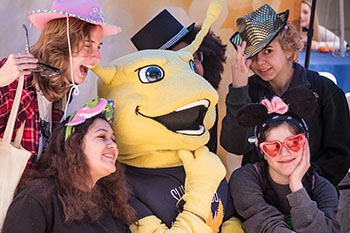

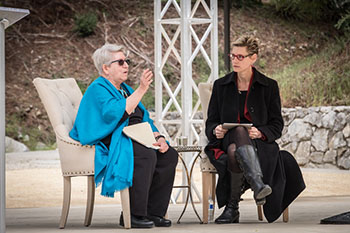
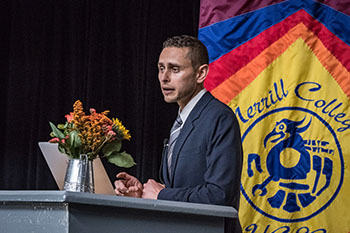
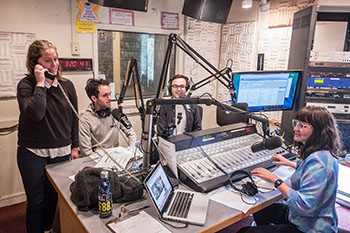

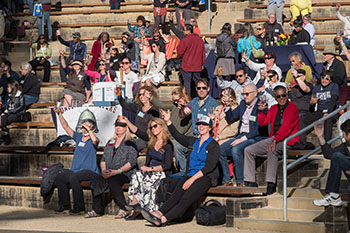
A wild and colorful group of Banana Slugs returned to campus for UC Santa Cruz’s Alumni Weekend celebration, reveling at the renovated Quarry Amphitheater, crafting tie-dye T-shirts at a “maker’s faire,’’ and giving a well-deserved “standing-O’’ to a revered professor.
They cooled down with frozen chocolate-covered bananas after stomping their way through the Campus 5K Fun Run. They posed for pictures with Sammy the Slug, flagged down free “Slug taxis’’ driven by campus staff members, and took to the airwaves at KZSC FM, UC Santa Cruz’s homegrown radio station, now celebrating 50 years of music and inspiration.
In other words, returning alumni were never at a loss for things to do, people to meet, beer glasses to drain, and topics to explore. But these prodigal Banana Slugs also had time to look back and reflect on how their time at UC Santa Cruz molded their philosophies and career outlooks.
This was certainly true for Jeremy Mifsud (Cowell ’14, philosophy), a substitute teacher who plans to go to San Francisco State University for his teaching credential. Mifsud has his sights on a career as a history teacher—and UC Santa Cruz helped him on his way by awakening his social consciousness while honing his critical thinking skills. “This place shaped me immensely” he said, while taking a break from Alumni Weekend festivities in Quarry Plaza.
UC Santa Cruz felt like welcome break from San Mateo County when he first set foot here. “Not to say my hometown is horrible, but no one smiles,” he said. “I didn’t know what a tight-knit community was until I got here.”
JoanMay Cordova (Cowell, ’77, community studies) felt like she was among family while attending Alumni Weekend with close pal Evelyn Casuga (Merrill ’76, community studies/psychology.)
When the two of them met for the first time as undergraduates, they were among a tiny contingent of Filipino-American students on campus. Both hail from small, Central Valley farming communities, and their connection was immediate: “It felt like we were twin sisters with different mothers!” Cordova said.
Raise the roof. Bring down the house
Beloved feminist studies professor Bettina Aptheker held court on Saturday at the recently reopened campus landmark, the UC Santa Cruz Quarry Amphitheater.A steady and reliable force on campus for four decades, Aptheker gave a powerful speech about the ethical role of public universities.
“Given the state of ‘no ethics’ percolating through the current administration in Washington, it is very hard to know quite where to begin today,” Aptheker said during the Faculty Keynote/Baskin Ethics Lecture. “The ethical collapse in Washington pervades the country.”She argued that this collapse is tethered to misogyny, racism, and assaults on women’s reproductive health, along with a spirit of anti-intellectualism. She also decried the “grossly underfunded” state of California’s K-12 educational system and diminished public funds for higher education, which paved the way for nominal college fees giving way to tuition costs that create new barriers to young scholars.
But Aptheker’s speech was far from gloomy. “Don’t give up. Don’t be despaired. Oh, no, no, no, we don’t despair, we just get ourselves up and go forward.”
Aptheker, the Peggy and Jack Baskin Foundation Presidential Chair for Feminist Studies, laid out this path forward for the audience, and got a standing ovation for her efforts. She urged strong public resistance to ensure that the university is a “sanctuary for human rights, Dreamers, scientific research, and academic freedom.”
But she also urged academics to step up their game and broaden their outreach. In her on-stage dialogue with campus provost and executive vice chancellor Marlene Tromp, Aptheker said that today’s academics, faced with a climate of rampant anti-intellectualism, must make sure their work is accessible and beneficial to the public, and that their writings and research have an audience that goes far beyond other academics.
Arts, crafts, and the return of DJ Oy Dog
All over campus, so much was going on that it was easy to get double-booked. Everywhere you looked, something big was happening. Alumni toured biomedical science labs, browsed through the farm, and succumbed to the power of Janet Cardiff and George Bures Miller’s astounding sound installation, Forest (for a thousand years…). at the UC Santa Cruz Arboretum.KZSC FM called alumni deejays back to the station to celebrate its 50th. One of those returning broadcasters was Dylan Music—yes, that is his real name—who made a name for himself on campus with his radio show Muzikal Jewz, a smorgasbord of rarities, comic masterpieces, and Jewish-themed novelty songs. In those days, his on-the-air nickname was DJ Oy Dog.
Music (Kresge ’08, literature), now a morning host at KAZU FM, the Monterey Bay NPR affiliate, rhapsodized about the creative breakthroughs he had at KZSC. “They let you have free rein,” he said. “What do you want to do to fill radio air space? There were unlimited possibilities.”While on the air, Music hoped for “50 more years of the log cabin in the woods,” referring to KZSC’s rustic digs at Merrill College. Then he spun a toe-tapping little ditty called “It’s a Scream When Levine Does the Rhumba,” a vintage tune sung by Ruth Wallis.
Getting serious
One of the glories of Alumni Weekend is the variety. Just by walking a few feet, you could go from silly to serious, from goofy to revelatory, simply by switching up the venue. Within short walking distance of KZSC, professor Mark Fathi Massoud drew a capacity crowd to the annual Noel Q. King Memorial Lecture in History and Comparative Religion, where he explored intricacies of shari’a.
Massoud, associate professor of politics and legal studies at UC Santa Cruz, said shari’a, which encompasses ethical formation, faith traditions, and living practices that invite interpretation, learning, and education, is “much more malleable’’ than many people realize.
“If we see it merely as the divine revelation of God interpreted by jurists, judges, and people every day,” we miss the way that Muslims across the world “make and remake and embrace” shari’a, using it as a tool to make ethical decisions.
For instance, he talked about interviewing a devout Muslim woman, living in conservative Orange County, who decided in 2008 to vote against Proposition 8, a California ballot initiative whose supporters wished to roll back same-sex marriage. The measure was effectively overturned by the Supreme Court five years later.
“She read the Koran, she went on YouTube to hear religious leaders speak, and she spoke to an imam,” Massoud noted. “She decided that to be shari’a compliant, her duty was not to take a legal right from people who already had it.”
In the same venue, a Merrill College Alumni Panel regarding free speech and academic freedom—part of Merrill’s 50th anniversary celebration—included a passionate exploration of a pressing question: What would they do if a highly controversial and inflammatory far-right speaker, with a history of homophobic, anti-Semitic, and racist statements, was invited to speak on campus?
During a presentation entitled “Five Decades of Free Speech and Political Action at UC Santa Cruz,” the panelists said that such people should be allowed to speak, regardless of their odious views, to preserve freedom of speech on campus, insisting that these events, painful as they may be, can still be an opportunity for dialogue and transformation.
“I’m concerned about the suppression of free speech,” even in cases where a speaker is bringing forth loathsome and hateful points of view, said Mark Stephens, (Merill, ‘83, community studies and sociology) who is an author and yoga teacher.
But panelists also insisted that hate speech be challenged in nonviolent ways. History has shown that unchecked and unchallenged hateful and divisive speechmaking can lead to violence and even genocide, said Adam Butler (Merill, ‘09, American studies) who works for Lezyne USA Inc., a San Luis Obispo-based company that creates high-tech bike accessories.
“Sometimes the absolute acceptance of free speech can lead to danger and violence,” Butler said. “Things can go wrong very quickly if there aren’t some kinds of checks and balances.”
He said he also has concern that mere “shock purveyors,” passing themselves as political commentators, are showing up at communities expressly to cause trouble.
Getting downWith such hot topics on their minds, alumni needed a chance to mellow out before leaving campus. That’s why hundreds of them flocked to the aptly named “Wind Down: Alumni Beer and Wine Reception” at the Quarry Amphitheater, where jazzy music, good conversation, mini-hot dogs, assorted cheeses, and delicious beverages awaited them.
Slugs sipped local offerings from homegrown breweries New Bohemian and Uncommon, tried wines from alumni vintners, and looked forward to the next reunion. In the waning light, Sammy Slug joined the crowd in doing “the wave.”
The festivities ended with a wish from Marlene Tromp, who toasted the gathering before a striking backdrop of rocky outcroppings, majestic trees, and open sky: “Here’s to 50 more magical years,” she said, invoking the crowd to raise their glasses. “Salud!”